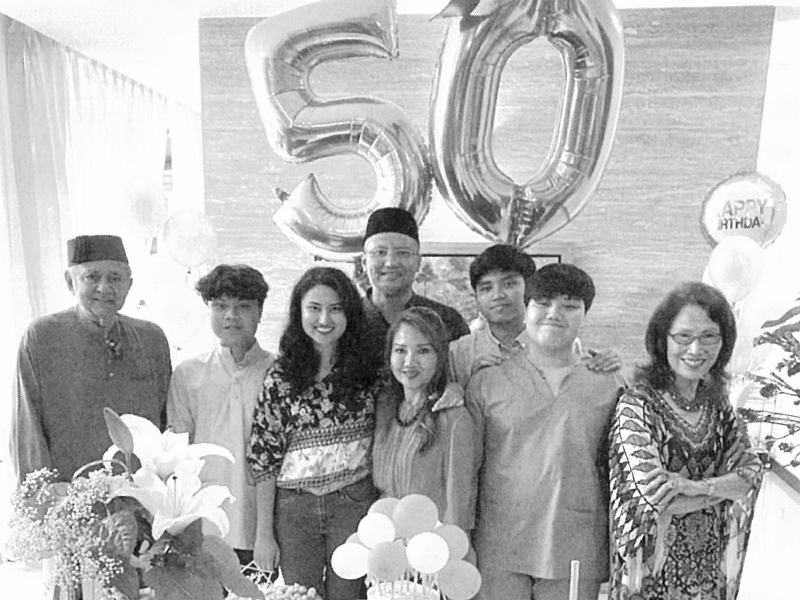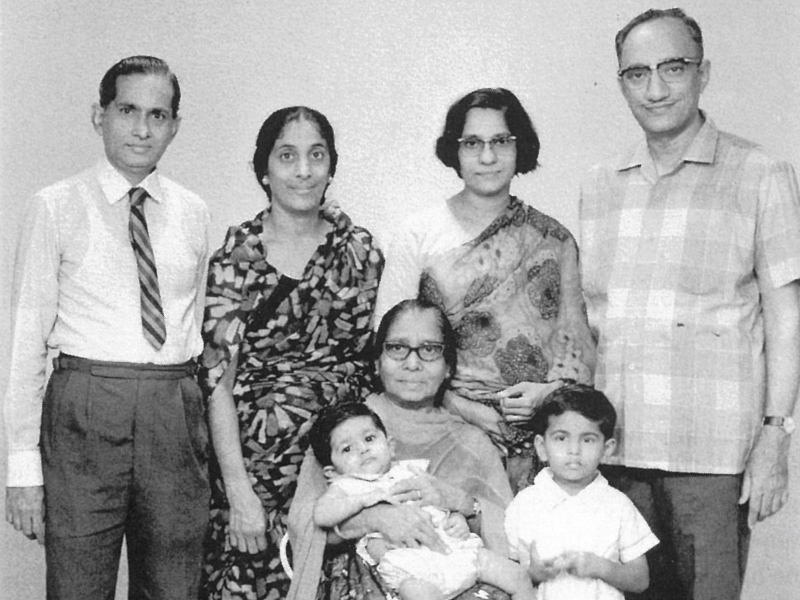
This collection of 26 essays offers personal glimpses of men born into poverty and obscurity who persevered and became well known and respected for their generosity, vision and contributions to the community and nation (All photos: Universiti Malaya Press)
When talking about their bapa, appa or dad, words such as taskmaster, disciplinarian, stern, no-nonsense, conservative and flawed crop up. But the sons and daughters behind Fathers And Their Wisdom also remember men who placed family above self: civil servants, academics, corporate figures, doctors, enforcement officers, diplomats and lawyers who, by dint of hard work, opportunity and skills, made good, did good and, by example, set the bar high for their children.
This collection of 26 essays published by Universiti Malaya Press offers personal glimpses of men born into poverty and obscurity who persevered and became well known and respected for their generosity, vision and contributions to the community and nation. Or those from privileged backgrounds that went on to make a name for themselves without losing hold of the manners, ethics and values that make a decent human being.
While the contributors are a veritable who’s who in Malaysia, their fathers are often more, leaders who set the direction for others, pioneers in their respective fields, leading figures in banking, industry, education, arts, culture and politics, with interesting stories of their lives and the towns and times that shaped them.
But these parents with extraordinary careers are usually most comfortable at home doing ordinary things, like rearing fish or supervising their children’s schoolwork, going on holidays with the family and just being themselves.
Sofiya Anisa says her dearest daddy, Shazal Yusuf Mohamed Zain, had a “goofy side characterised by a high-pitched cackle that would tell you he was up to no good”.
pg224.jpg

Ahmad Azizuddin Zainal Abidin was a joyful hedonist who had a favourite phrase, “Kita joli aje”, shares daugher Aniza. Because, if you have a bit of money and good health, why wait? “Bapak let me pursue random things, trusting that I would find my way back. This freedom and belief made me quite fearless.”
As an industrial arts teacher, Chong Hai Chin taught generations of boys woodworking, copper tooling and ironwork. Education was the gateway to a better life and literacy was the key, he believed. When young, he used to “steal” reads over others’ shoulders. He devoured the newspapers in Mandarin, English and Malay, and taught himself to read and write Jawi — something he also did with his daughter Su Li.
The inimitable Ani Arope’s family did not celebrate many of his achievements or proud moments. “To bapak, it was business as usual. No fuss,” remembers son Ismail. Towering Ani had a big voice that roared when he grew impatient or angry. But the man who led some of the top institutions in the country had a soft spot for animals. “He talked to cats, sometimes refusing to move for hours while suffering muscle cramps, so as not to wake a sleeping feline on his lap.”
Sarjit Singh believed in gender equality and sewa, what the Sikhs see as selfless service. This English teacher sent his daughter Jasbir Kaur to the UK for further studies and travelled daily for 25 years to teach at schools in various districts of Negeri Sembilan.
Bujang Mohammad Nor was practical, pragmatic and good at problem-solving. He liked to keep things as simple as possible and let common sense prevail. His rule of thumb in investing was not to be greedy but to look for steady growth. And of course, “time is money”, says daughter Masnoon.
In the early 1930s, Sardar K Pritam Singh sailed to Malaya from Punjab, India, with a small trunk and the belief that with a sound education and integrity, one stands second to none. “One red mark on the report card, and there would be hell to pay,” recalls Ajit Singh Ludher, the youngest of his 13 children. Pritam reared cattle, goats and chickens, set up a small sundry shop and ran a taxi business to earn money for his children’s education. He became a true hero after rushing into a neighbour’s burning house to rescue someone. “His beard was singed but he saved that person.”
pg255.jpg

As a magistrate, Abdul Kadir Yusof had to see justice done. But he dispensed it fairly and with empathy, says daughter Faridah, who treasures dad’s pearls of wisdom. “What is the smallest thing you can think of?” Dust? “No! It’s someone whose feelings have been hurt — kecil hati dia.” From this, she learnt to be careful with words because, once spoken, they cannot be retracted.
Siblings Marinna, Johan and Melissa came together for “the truth about dad”, Jaafar Indot, a good man, simple at heart, who had to fend for himself and look after his siblings after his mother died when he was 11. “He paid attention to life. He lived learning through other people’s experiences. They were his point of reference. Nothing startled him or ruffled his feathers.”
Watching leprosy patients suffer social isolation, young Collin Abraham developed empathy for the marginalised. An entertainer, musician and storyteller, he was always game to don outrageous costumes for fancy-dress parties. But seriously, concern for economic and sociopolitical issues led him to change the concept of social work: instead of giving the needy handouts, they were provided opportunities to help themselves and rise above their circumstances.
“Don’t wait for opportunities to appear. Create them. And when one presents itself, be ready because you only have one chance to grab it.” This wise counsel Suhaimi picked up from his parent, Sulaiman Maatan, gave him the strength to venture into many unrelated fields, leading to a career that spans broadcast journalism, media consulting and content strategist.
Medicine runs in the blood of Dr Hussein Awang, a founder of Tawakkal Hospital, one of the first few private ones in Kuala Lumpur, named after his grandfather’s house in Johor Bahru and his father’s clinic there. Tawakkal is Arabic for “trust in God”.
pg_20_pic.jpg

Humble, handsome and a healthcare hero, says his daughter Zanariah Hussein, the good doctor encouraged her to persevere and work in the government sector. Which she did, following in his footsteps by specialising in endocrinology and eventually setting up the Endocrine Institute of Hospital Putrajaya.
Hussein loved Johorean food, sports, books and horses and was interested in their selective breeding. Janda Baik, where he built a wooden house by the river, became a weekend retreat for the family, where he could check on his horses and plan cleanups with the workers. When he had to let go of the property after two decades, “it left a void, an unsettled little dark spot in him that would not just fade away”.
In ‘Gone Too Soon’, Khairy Jamaluddin laments losing his father at 16 and wonders about the conversations they could have had, which he thinks would have shaped his worldview differently. Jamaluddin Abu Bakar, who died at the age of 63, was the 11th son and second last boy from a village headman’s union with his first wife.
Penghulu Abu Bakar had 23 children altogether and curious, rational Jamaluddin knew he had to step beyond the shadow of Gunung Datuk in Kampung Gadong, Negeri Sembilan, to make something of his life. He studied at the Malay College Kuala Kangsar, read history at University of Malaya and joined the foreign service three months after Merdeka.
“He wanted me to inherit his love for the world and how it all works,” says Khairy, who was always seeking the approval of this “loving but also tough taskmaster who wanted me to exceed expectations”. Papa is no longer on the touchline of the football field, but choosing to serve as a member of parliament (2008-2022) for Rembau, the district where Gadong lies, was “maybe my way of bringing him home”.
Hyder Esmail Tyebkhan, Andrew Wong Hin Kok, Syed Mohd Mumtaz Wafa, Abdul Jalil Sheikh Mohamed, Koh Pooi Kee, Nik Hashim Nik Yusoff, Fauzi Abdul Samad, V S Param, Kamaruddin Ismail, Mohd Noor Merican, Lim Cheng Chwee, Ujang Malik and Lim Peng Fei are the other fathers featured in the book.
From their children’s lips to the page, we read precious memories of men who sacrificed so their family would be better off, who made the most of what life dealt them and led by example, who broke the traditional mould of fathers by openly showering their offspring, and the next generation, with attention, guidance and love to last a lifetime and more.
Purchase a copy of 'Fathers And Their Wisdom' for RM72 here.
This article first appeared on Nov 18, 2024 in The Edge Malaysia.


